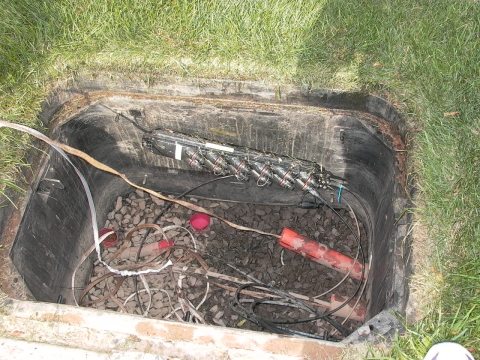What's future proofing worth? Analyzing the Verizon FiOS bet

There's a lot of discussion today about whether Verizon's $23 billion investment in its FiOS network was worth it, but the argument really comes down to this: How much is future-proofing your business worth?
The New York Times did an in-depth analysis about Verizon's FiOS rollout and quotes a prominent bear on the effort. Verizon bet a bundle and moved to offer a triple play--TV, Internet and phone--to better compete with cable.
Saul Hansell, who also detailed the bear case separately, pits Wall Street skeptics and Verizon against each other. Verizon claims FiOS is a hit while others--some of them given some play here--say that it's a losing battle.
The whole discussion raises interesting economic questions: Would Verizon have been better off handing $23 billion over to shareholders? Should Verizon have just let its phone and DSL business whither on the vine? Does Verizon have an obligation to compete in what used to be its dominant turf? Should Verizon just go wireless? And the biggest one: How do you weigh short-term costs (and Wall Street's 3-month myopic view) with the long run?
Economics and assumptions aside I argue that Verizon made the right call. Sometimes you have to go with your gut and make a few big bets. Here's what Verizon could have done:
- It could have stood by and watch cable become the dominant monopoly;
- It could have watched its access lines dwindle to nothing;
- Or it could have used its growth engine--wireless--to diversify and future proof its business.
Door No. 3 will turn out to be the best move. If Verizon did nothing its business would look a lot like AOL or EarthLink, two companies trying to retool as a former cash cow dies. If Verizon did nothing the shareholder hackles would be even worse. They'd want Verizon Wireless spun off or some corporate shell game in the name of shareholder value.
Disclosure: I'm a Verizon FiOS TV and Internet subscriber and glad the company made the move. Since installing it a little more than a year ago (
But if you work from home at all you just can't have Comcast's flaky network under the hood.
In the grand scheme of things there will be two flavors of broadband and TV providers--cable and fiber to the premises (FTTP). And guess what will win the day? Perception and customer service. It won't happen overnight, but making customers--instead of short-term investors--usually pays off big. And I can tell you I'm feeling pretty good about Verizon, which wasn't the case back in my DSLHell days.
Simply put, Verizon has future proofed a few things. First, it has future proofed a customer base. Second, Verizon has future proofed its network. While Comcast upgrades, Verizon can flip a switch to get me more bandwidth. That edge will last for years. Is that worth $23 billion? In my book it is.